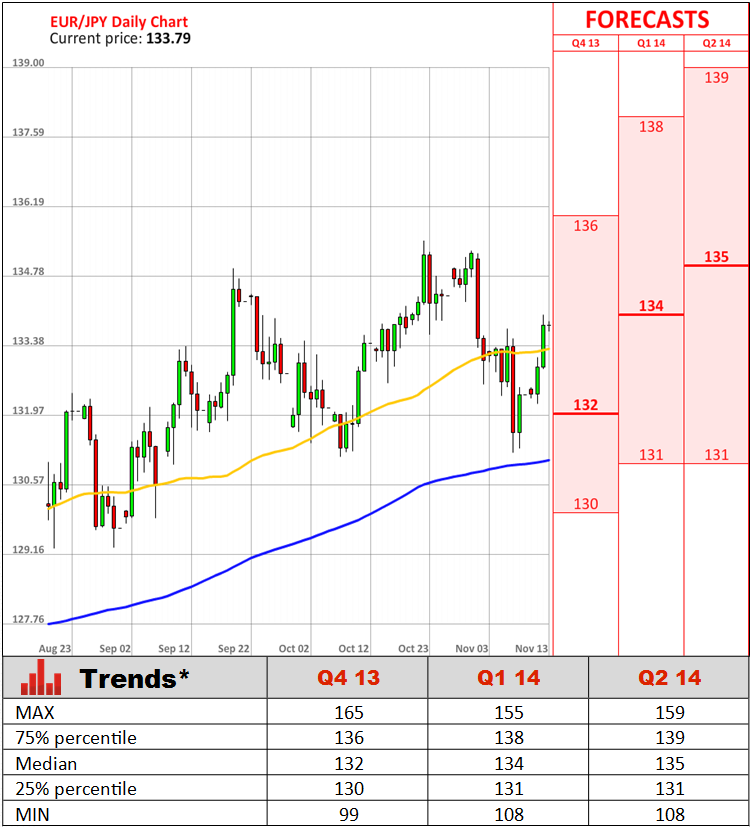Shinzo Abe's ultra-loose monetary policy and other set of measures also known as Abenomics are boosting growth in the world's third largest economy, making investors more confident about economic prospects, hence, attracting more investment in the economy. However, the other side of the coin is that exports still remain subdued, while Tuesday's data showed falling activity in the services sector as well as falling consumer mood. Japanese firms curbed their purchases of services during September, as the index of activity in tertiary industries fell 0.2%, after a 0.7% gain recorded a month earlier, underscoring a challenge for the government, who seeks for greater business investment, higher wages and stronger consumption levels. The main downside pressure came from the science, research and professional services industry, where activity sank 4.9%. In addition to that, the Cabinet Office said that a measure of confidence amid Japanese consumers fell to 41.2 in October, compared with 45.4 in September, moving further away from the key level of 50. The Cabinet Office, decided to keep its assessment on consumer mood, saying it is still in an improving trend.
Note: This section contains information in English only.
Shinzo Abe's ultra-loose monetary policy and other set of measures also known as Abenomics are boosting growth in the world's third largest economy, making investors more confident about economic prospects, hence, attracting more investment in the economy. However, the other side of the coin is that exports still remain subdued, while Tuesday's data showed falling activity in the services sector as well as falling consumer mood. Japanese firms curbed their purchases of services during September, as the index of activity in tertiary industries fell 0.2%, after a 0.7% gain recorded a month earlier, underscoring a challenge for the government, who seeks for greater business investment, higher wages and stronger consumption levels. The main downside pressure came from the science, research and professional services industry, where activity sank 4.9%. In addition to that, the Cabinet Office said that a measure of confidence amid Japanese consumers fell to 41.2 in October, compared with 45.4 in September, moving further away from the key level of 50. The Cabinet Office, decided to keep its assessment on consumer mood, saying it is still in an improving trend.

Wed, 13 Nov 2013 07:49:02 GMT
Source: Dukascopy Bank SA
"The BOJ will continue with quantitative and qualitative easing, aiming to achieve the price stability target of 2 percent, as long as it is necessary for maintaining this in a stable manner"
- Haruhiko Kuroda, Bank of Japan Governor
Shinzo Abe's ultra-loose monetary policy and other set of measures also known as Abenomics are boosting growth in the world's third largest economy, making investors more confident about economic prospects, hence, attracting more investment in the economy. However, the other side of the coin is that exports still remain subdued, while Tuesday's data showed falling activity in the services sector as well as falling consumer mood. Japanese firms curbed their purchases of services during September, as the index of activity in tertiary industries fell 0.2%, after a 0.7% gain recorded a month earlier, underscoring a challenge for the government, who seeks for greater business investment, higher wages and stronger consumption levels. The main downside pressure came from the science, research and professional services industry, where activity sank 4.9%. In addition to that, the Cabinet Office said that a measure of confidence amid Japanese consumers fell to 41.2 in October, compared with 45.4 in September, moving further away from the key level of 50. The Cabinet Office, decided to keep its assessment on consumer mood, saying it is still in an improving trend.
One of the main pillars of Abenomics is weak currency, and it can be easily achieved with the unprecedented stimulus measure. Hence, the Yen hit the lowest level in seven weeks against the greenback, as the gap between yields on Japanese bonds and U.S. 30-year government securities widened to the biggest level since 2011.
© Dukascopy Bank SA
Actual Topics
Subscribe to "Fundamental Analysis" feed
Subscribe
Per scoprire di più sulla piattaforma di Dukascopy Bank per Forex/CFD, sul SWFX ed altre informazioni relative al trading,
la preghiamo di contattarci o richiedere di essere contattato (callback request)
la preghiamo di contattarci o richiedere di essere contattato (callback request)
For further information regarding potential cooperation,
please call us or make callback request.
please call us or make callback request.
To learn more about Dukascopy Bank Binary Options
/ Forex trading platform, SWFX and other trading related information,
please call us or make callback request.
please call us or make callback request.
Per scoprire di più sulla piattaforma di Dukascopy Bank per Forex/CFD, sul SWFX ed altre informazioni relative al trading,
la preghiamo di contattarci o richiedere di essere contattato (callback request).
la preghiamo di contattarci o richiedere di essere contattato (callback request).
To learn more about Crypto Trading / CFD / Forex trading platform, SWFX and other trading related information,
please call us or make callback request.
please call us or make callback request.
To learn more about Business Introducer and other trading related information,
please call us or make callback request.
please call us or make callback request.
For further information regarding potential cooperation,
please call us or make callback request.
please call us or make callback request.